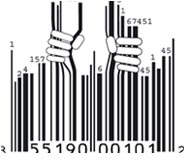|
|
 |
 View Additional Info
View Additional Info
Breaking Out of Bar(code)s: Manu Chao, Moby, and Noam Chomsky Tag Team for Another World
The music on Another World is Possible to be released in the USA by Uncivilized World on October 18, 2005 exposes a cross-section of alternatives to globalization; musically and philosophically. Many of the artists brought together for this thought-provoking project offer a critique of globalization, both in their lyrics and in their daily practice. They break out of the bar(code)s that threaten our freedom of independent speech to talk the talk. They walk the walk by re-envisioning the role of the musician, either as activists or as community development leaders.
Musicians were chosen for the CD because of their demonstrated commitment to speaking up about the state of the world. But—for the most part—it was the musicians themselves that chose what tracks to include on the disc. Several of the songs have never been released before or are rare tracks.
The disc kicks off with an exclusive track by Manu Chao, one of the world’s best-selling artists (as in millions of CDs), and someone who has been visible performing at major demonstrations. Chao told the BBC in an interview: “I'm completely in support of the anti-globalization movement. I donate royalties to the Zapatistas in Chiapas, and I don't trust politicians - you've got to act on a neighborhood level. But the last thing the movement needs is for someone like me to be held up as its ‘leader’. Getting away from icons and personality cults is what makes the movement so attractive.” Interestingly, Chao’s father—Ramon Chao is a well-known writer and alter-globalization activist.
Other highlights of the album include film-maker turned jazz-rocker Emir Kusturica’s gypsy brass take on The Clash’s “Lost in the Supermarket.” Coincidentally another song made famous by The Clash, “Police on My Back,” is sung this time by Asian Dub Foundation, the U.K. collective that challenged stereotypes about what a band of South Asians could sound like, and Zebda, a popular French band known for championing the poor. Lee Scratch Perry is at his best with “Dancing Shoes.”
While rare live versions by Femi Kuti and The Skatalites tout freedom, the album also offers a dose of American music with electronic breakout artist Moby and mythical Detroit techno-originators Underground Resistance, who have become known for being unknown. After many people in Europe made a lot of money on the backs of the artists of “Motor City,” Underground Resistance created their own successful label and distribution company. Their entrepreneurial efforts—an outgrowth of the fight for Civil Rights—aim to keep money in the Black community; even employing people neighborhood street kids to help them develop their own careers.
Another World is Possible will be released in the form of a CD-sized, hard-cover book, featuring fifty pages of essays by some of the greatest thinkers and critics of globalization and photographs that poignantly capture demonstrations against globalization in its current form. Featured writers include M.I.T. linguist Noam Chomsky, Canadian journalist Naomi Klein (who writes about “brand bombing”), and Mexico’s Subcommander Marcos. The writing of two Nobel Prize winners are also included: Portugal’s José Saramago (Literature, 1998) and Iran’s Shirin Ebadi (Peace, 2004).
Uncivilized World founder and Frenchman Arnaud Frisch produced Another World is Possible with two goals in mind. “We want to provoke people that like these artists to read something about the dangers of savage globalization and have a debate about it,” Frisch explains. “We are not trying to teach people what we believe, but we want them to think about it for themselves.”
The other goal is to raise money for ATTAC, an international organization that is trying to create an alternative to the type of globalization that puts profit about people, multinational corporations over national governments. ATTAC stands for the Association for the Taxation of Financial Transactions for the Aid of Citizens. ATTAC originated to support Nobel prize-winning American economist James Tobin’s proposal to tax currency speculators’ trade to meet urgent global priorities such as preventing global warming, disease, and poverty. A first step inspired by the concept put forward by ATTAC is being proposed at the September UNO meeting in New York City: an international tax on airplane tickets to support the fight against AIDS, tuberculosis, and pollution. While the organization has gone on to broaden their agenda to a wide range of issues around globalization, it is not “anti-globalization,” but instead calls for globalization policies that are just and sustainable. One ATTAC slogan says “The world is not for sale.”
“This album calls for an alternative form of globalization capable of rallying together resistants from the mountains of Chiapas, untouchables from New Delhi, farmers from the Larzac region in France, and Human Rights campaigners in Tehran,” explains UW founder Frisch. “Mirroring this diversity, music becomes a tool to construct another world, in contrast to the uniformity imposed by the entertainment industry.”
Additional Info
 Breaking Out of Bar(code)s: Manu Chao, Moby, and Noam Chomsky ...
Breaking Out of Bar(code)s: Manu Chao, Moby, and Noam Chomsky ...
 About Uncivilized World
About Uncivilized World
 We Farmers by: José Bové
We Farmers by: José Bové
 From the Mountains of Southeast Mexico
by: Subcommander Marcos
From the Mountains of Southeast Mexico
by: Subcommander Marcos
 The Dawn by: Ignacio Ramonet
The Dawn by: Ignacio Ramonet
 FROM JUSTICE TO DEMOCRACY BY WAY OF THE BELLS by: Jose Saramago
FROM JUSTICE TO DEMOCRACY BY WAY OF THE BELLS by: Jose Saramago
Top of Press Release
|
|
 |
|
|
|